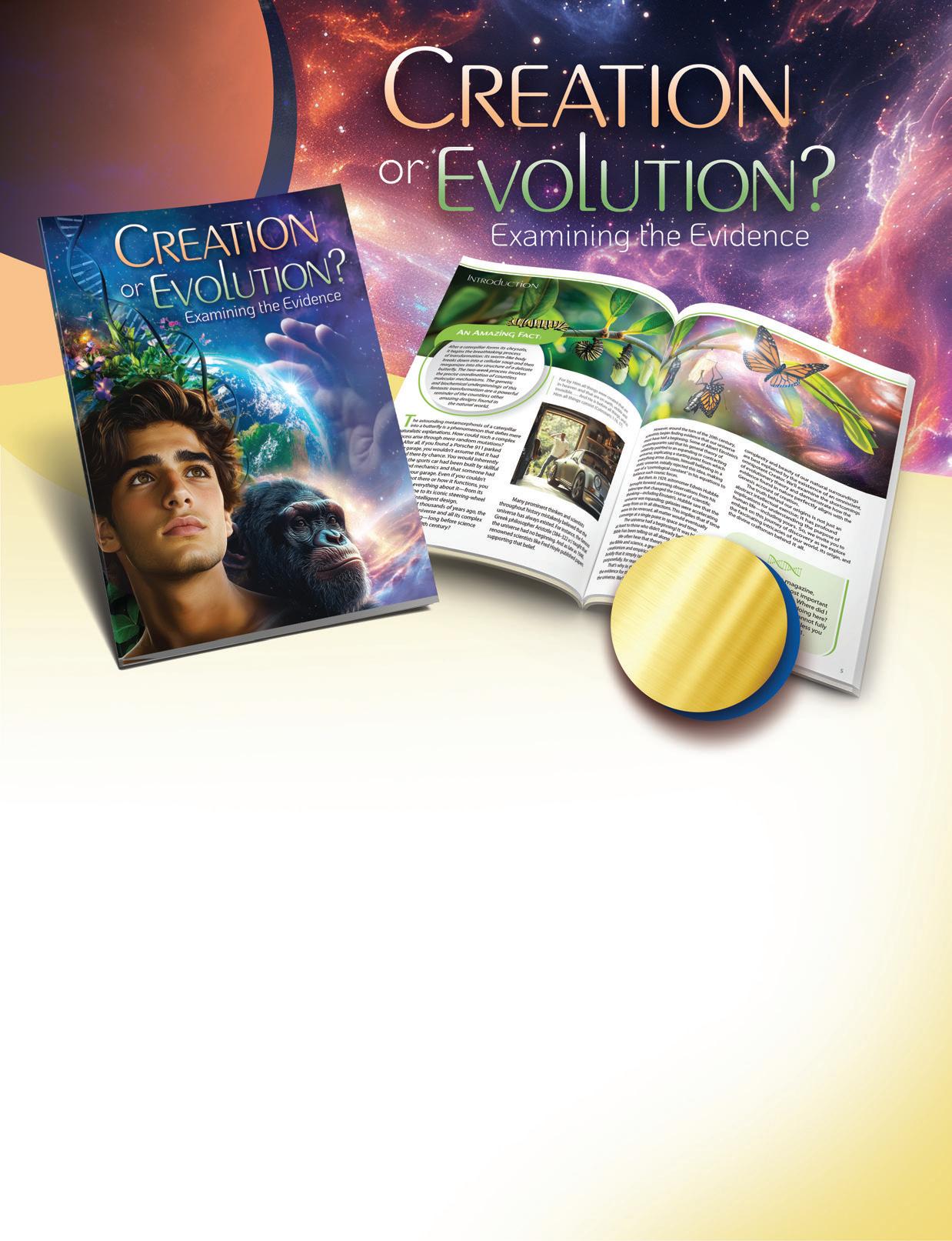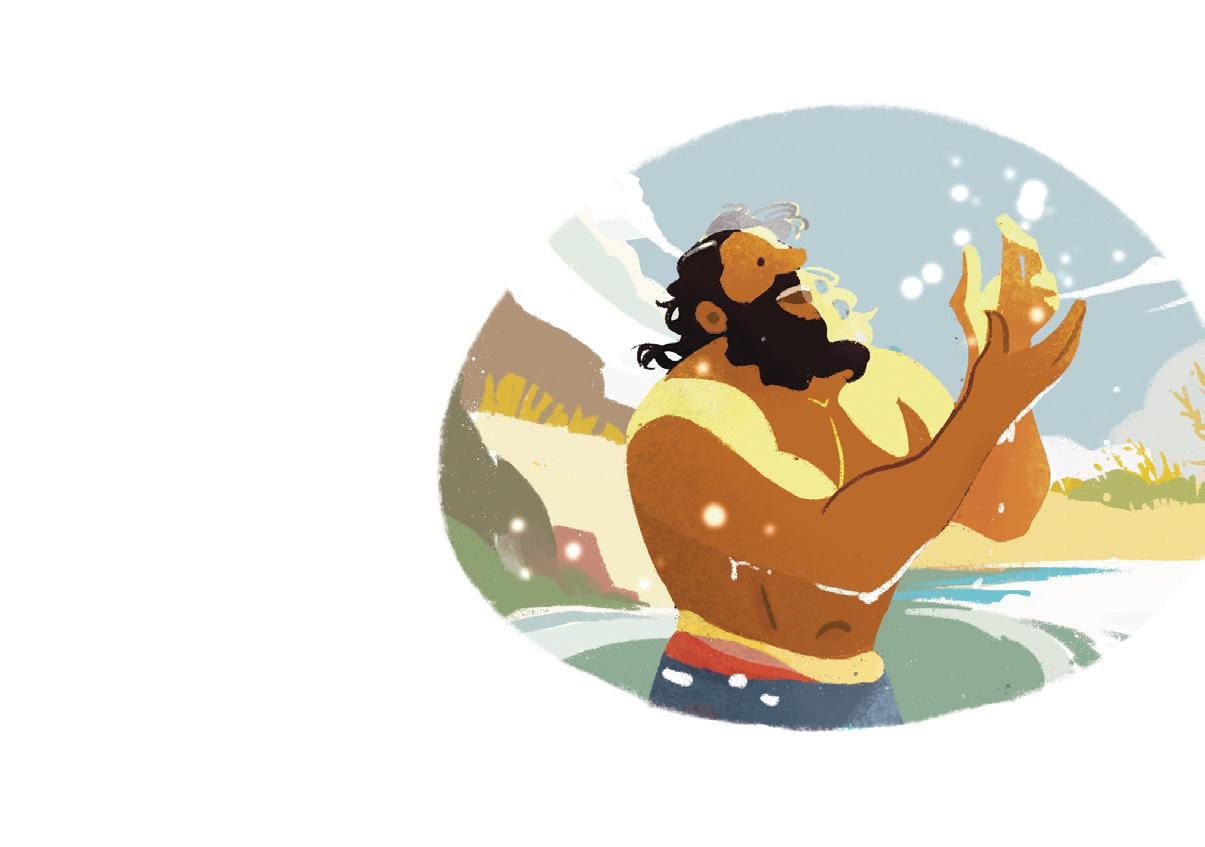

Stargazing
I Will Go and Proclaim Christ’s Second Coming!

The second coming of Christ is one of the core beliefs of the Seventh-day Adventist Church. In fact, it is even in our name, declaring our hope in the second advent of Christ.
Based solidly on Scripture, the belief in Christ’s return has been the hope of Christian believers down through the ages.
Jesus instructed His followers, “Let not your heart be troubled; you believe in God, believe also in Me. In my Father’s house are many mansions; if it were not so, I would have told you. I go to prepare a place for you. And if I go and prepare a place for you, I will come again and receive you to Myself; that where I am, there you may be also” (John 14:1-3).
The promise of His return was reiterated at Christ’s ascension when angels asked His disciples, “Why do you stand gazing up into heaven? This same Jesus, who was taken up from you into heaven, will so come in like manner as you saw Him go into heaven” (Acts 1:11).
And these are just some of the many promises we find throughout Scripture assuring us that one day soon Jesus will return.
During this Week of Prayer we will be blessed as we focus on the wonderful privilege of proclaiming, “I Will Go and Proclaim Christ’s Second Coming!”
Through a series of engaging readings throughout the week, Pastor John Bradshaw leads us through Scripture as we carefully consider what role we have in proclaiming the wonderful news that Jesus is coming soon. The final reading for this special Week of Prayer comes from the inspired writings of Ellen G. White.
And of course, in addition to these excellent readings, this week also emphasizes prayer. Whether you experience this Week of Prayer together in your local church, in small groups, with your family, online, or even alone, let us all unite in prayer as we together plead for the outpouring of the Holy Spirit so we can finish the work and go home.
May God bless you as you renew your commitment to the Lord, saying, “I Will Go and Proclaim Christ’s Second Coming!”

The principal contributor to the Week of Prayer readings is John Bradshaw, president of It Is Written, a media evangelism ministry based in Collegedale, Tennessee, United States. His programs have been filmed on six continents and are viewed globally and on It Is Written’s own channel, It Is Written TV. Pastor Bradshaw has held more than 100 evangelistic series in cities around the world. He is thankful to work alongside a dedicated team of people committed to sharing the everlasting gospel. He is married to Melissa, and they have two children.
Ted N. C. Wilson
John Bradshaw
The hope of The Ages

The second coming of Jesus in the proclamation of the church
Ted N. C. Wilson
Photo: Declan Sun / Unsplash

nprecedented events across the globe remind us that the world is changing rapidly. Natural and human-made disasters are becoming more forceful and frequent. Political situations in many countries are becoming nearly impossible to solve. Societal and cultural morals are breaking down. The global economy is walking on a paper-thin edge ready to fall into economic chaos. Ecumenical movements are creating compromising situations. We must always be friendly and encouraging to other Christians and faiths, but we need to be very careful not to align ourselves with ecumenical or other groups that will endeavor to neutralize the distinctive biblical beliefs that Seventh-day Adventists hold dear.
As we see landmark occurrences happening rapidly all around us, we know they point to the most incredible, life-changing event ever—the second coming of Jesus Christ! This is the culmination of all the hopes of believers down through millennia.
In describing that glorious event, the prophet Isaiah wrote, “And it will be said in that day: ‘Behold, this is our God; we have waited for Him, and He will save us. This is the Lord; we have waited for Him; we will be glad and rejoice in His salvation’ ” (Isa. 25:9). And in Psalm 50:3 we read, “Our God shall come, and shall not keep silent; a fire shall devour before Him, and it shall be very tempestuous all around Him.”
HOW QUICK IS “QUICK”?
And yet, how quick is “quick”? From our human point of view—especially in today’s Instagram world—anything less than instant is slow.
Adventists have been preaching the second coming of Christ for more than 160 years—which can seem like an eternity to some. Disheartened, some have lost their sense of urgency in the second coming of Christ, which should permeate every aspect of Seventh-day Adventist life.
This should not surprise us, however. We read in 2 Peter 3:3, 4: “Scoffers will come in the last days, walking according to their own lusts, and saying, ‘Where is the promise of His coming? For since the fathers fell asleep, all things continue as they were from the beginning of creation.’ ”
Peter points out that these scoffers “willfully forget” that God created the heavens and the earth, and that there was a worldwide flood. He then warns that one day all will be destroyed by fire.
The passage goes on, giving important instruction and encouragement to those who believe: “Beloved, do not forget this one thing, that with the Lord one day is as a thousand years, and a thousand years as one day. The Lord is not slack concerning His promise, as some count slackness, but is longsuffering toward us, not willing that any should perish but that all should come to repentance” (verses 8, 9).
how quick is “quick”? from our humAn poinT of view— especiAlly in TodAy’s insTAgrAm world—
While on earth, Jesus assured His disciples, “I go to prepare a place for you. And if I go and prepare a place for you, I will come again and receive you to Myself; that where I am, there you may be also” (John 14:2, 3). He repeats this promise with urgency in Revelation 22: “Behold, I am coming quickly! Blessed is he who keeps the words of the prophecy of this book” (verse 7); “And behold, I am coming quickly, and My reward is with Me, to give to every one according to his work” (verse 12); and “Surely I am coming quickly” (verse 20).
The passage urges us, since the earth and all things in it will be destroyed, to consider what kind of people we ought to be “in holy conduct and godliness, looking for and hastening the coming of the day of God. . . . Therefore, beloved, looking forward to these things, be diligent to be found by Him in peace, without spot and blameless” (verses 11-14).
AN IMPORTANT CALLING
What a calling we have, staying close to the Lord and allowing Him to guide us as we eagerly look forward to His coming.
The book of Hebrews encourages us: “Do not cast away your confidence, which has great reward. For you have need of endurance, so that after you have done the will of God, you may receive the promise: ‘For yet a little while, and He who is coming will come and will not tarry. Now the just shall live by faith; but if anyone draws back, my soul has no pleasure in him.’ But we are not of those who draw back to perdition, but of those who believe to the saving of the soul” (Heb. 10:35-39).
God’s Word is speaking to us today. Do not let anyone take away your hope in the soon coming of Jesus Christ. He is coming soon!
PROCLAIMING THE MESSAGE
Current deteriorating world conditions should awaken us to the urgent need to be ready, and to proclaim the three angels’ messages of Revelation 14 in anticipation of Christ’s soon return.
Some may say these messages are politically incorrect and not advisable to preach; however, the three angels’ messages are the most important messages we have been given to share. They are our theology and mission and the reason for God’s wonderful remnant church.
only by relying compleTely on
with fervent heat. . . . Since all these things will be dissolved, what manner of persons ought you to be in holy conduct and godliness, looking for and hastening the coming of the day of God, because of which the heavens will be dissolved, being on fire, and the elements will melt with fervent heat? Nevertheless we, according to His promise, look for new heavens and a new earth in which righteousness dwells.”
Jesus And The power of The holy spiriT will we be Able To Accomplish AnyThing!
In volume 9 of Testimonies for the Church we read, “In a special sense Seventh-day Adventists have been set in the world as watchmen and light bearers. To them has been entrusted the last warning for a perishing world. . . . They have been given a work of the most solemn import—the proclamation of the first, second, and third angels’ messages. There is no other work of so great importance. They are to allow nothing else to absorb their attention.” *
These powerful end-time messages, outlined in Revelation 14:6-12, are divided into three parts. The Spirit of Prophecy tells us that messages one and two were given by the early Advent believers. The third message would be added to the first two and would be given just before Jesus returns. The combination of these three messages will be the final appeal of God to this world to prepare to meet Jesus.
This is the exciting future for which we are being empowered and equipped—to finish God’s great work as we proclaim these mighty messages! Only by relying completely on Jesus and the power of the Holy Spirit will we be able to accomplish anything! God is preparing each of us for something very unusual that will soon happen—the outpouring of the latter rain of the Holy Spirit. And when we receive this special gift, God will work through us in a mighty way to reach the entire world with His last-day message. And then the end will come.
LEANING ON THE LORD
Jesus is coming soon! We need to lean completely on His grace and righteousness. We need to be faithful to the mission call He has for us. We read in 2 Peter 3:10-13: “But the day of the Lord will come as a thief in the night, in which the heavens will pass away with a great noise, and the elements will melt
As a Seventh-day Adventist, are you faithfully looking for new heavens and a new earth? Are you standing firm for the Lord’s biblical truth and for God’s great proclamation of the three angels’ messages of Revelation 14? Is your faithfulness to God known to all who come in contact with you? Are you convinced that God has a special plan for His remnant church? We do not say that we are more special than anyone else. We are all in need of the saving grace and mercy of our Lord. But, as Seventh-day Adventists, we are called by God to deliver His end-time message and to stand for truth though the heavens fall. He calls us to be faithful witnesses for Him today in a secular, materialistic, postmodern world.
LOOKING FORWARD
One day soon we will see, in the eastern sky, a small, dark cloud about half the size of a man’s fist. It will get larger and larger and brighter and brighter—all of heaven poured out for this climax of earth’s history. Everyone will see Him at the same time through a miracle of heaven. And there, seated in the middle of millions of angels, will be the One we have been waiting for: Not the humble broken Lamb, not the High Priest, but the King of kings and Lord of lords, Jesus Christ our Redeemer! We will look up and say, “This is the God we have waited for.” Christ will look down and say, “Well done, good and faithful servants; enter into the joy of your Lord,” and we will rise to meet the Lord in the air and go home to be with Him forever!
God has promised to give you His power to finish His work. He will pour out the latter rain on His people to proclaim the three angels’ messages and finish His work as a united church. Let’s dedicate our lives, energies, talents, resources, and time to finishing God’s work so we can win as many as possible, all through His power, and go home!
* Ellen G. White, Testimonies for
the Church (Mountain View, Calif.: Pacific Press Pub. Assn., 1948), vol. 9, p. 19.
I Have No Hands but Yours
when vandals broke the hands off a statue of Jesus outside a church in San Diego, California, a church worker placed a sign where it could be seen by passing motorists. Rather than a message of condemnation for those responsible for the damage, it was a message that appealed to the world. The sign read: “I have no hands but yours.”
Immediately before Jesus left our planet and ascended to heaven, He said to His closest friends, “You shall be witnesses to Me in Jerusalem, and in all Judea and Samaria, and to the end of the earth” (Acts 1:8). These words were an echo of what Jesus said in Matthew 28:19, 20: “Go therefore and make disciples of all the nations, baptizing them in the name of the Father and of the Son and of the Holy Spirit, teaching them to observe all things that I have commanded you.”
The Great Commission communicates an important truth. Jesus has no hands but those of His followers. As He farewelled His disciples, He committed to them the work of reaching a lost world with the saving message of the gospel.
Today, of the more than 8 billion people in the world, it is estimated that less than 2.5 billion are Christian.1 Many of the roughly 5.5 billion people who are not Christian have never even heard of Jesus or the cross. How, then, is the church, or the church member, to impact such a vast population?
THE LOST ONES
In Luke 15 Jesus taught three separate parables for the purpose of encouraging His people to take hold of the privilege of sharing Jesus with others. While similar in nature, the parables emphasize different truths.
The prodigal son was cured of his self-centeredness after losing all he thought would bring him happiness. Remembering the love he had experi -
enced, he returned home minus both his money and his pride, willing to accept the role of a servant if it meant he could be reunited with his father. The parable of the lost son teaches something important about the heart of God. Although a person may choose to abandon God, God does not abandon the lost. While in a pigsty, hunger gnawing at his stomach, the young man “came to his senses” (Luke 15:17, NASB) as he heard the Spirit of God speaking to his heart. The Holy Spirit still pursues wandering sinners, appealing to them that they return to the security of God’s loving heart. God does not leave the lost to find their own way home.
Unlike the prodigal son, the coin lost in the home of its owner did not know it was lost. Its owner swept and searched until she found her valuable possession. While the woman who had lost her silver coin lost something of value, and the father had lost one of his sons, another parable tells the story of a man who lost only 1 percent of his flock. While horses can sell for millions of dollars, and bulls and cows may sell for many thousands, a typical sheep is not especially valuable. Yet in the parable of the lost sheep, a shepherd leaves 99 sheep to venture into the potentially dangerous countryside in order to bring back one sheep.
It is a wonder the shepherd even knew one of his sheep was missing. It is impossible, merely by looking, to distinguish between 100 sheep and 99 sheep. Clearly this shepherd watched his flock carefully, indicative of the immense love God has for His wayward children. God notices when one of His children wanders off, and cares enough to be willing to undertake the most costly rescue mission in the history of the universe.
In The Desire of Ages Ellen White writes: “One soul is of such value that, in comparison with it, worlds sink into insignificance.”2
Jesus’ question to the Pharisees is directed today to His church: “What man of you, having a hundred sheep, if he loses one of them, does not leave the ninety-nine in the wilderness, and go after the one which is lost until he finds it?” (Luke 15:4). It was a rhetorical question. Of course they would search for a lost sheep! As Jesus said on another occasion: “Of how much more value then is a man than a sheep?” (Matt. 12:12).
WHAT GOD SEES
Walking near my home, I heard a soft thud on the ground beside me. Investigating, I saw a small, strange-looking creature with markings that resembled eyes, and two antennae that moved from side to side. I photographed and filmed the caterpillar-like creature and went home to show my wife.
Her response was direct. “Where is it? We have to save it! Take me to it right away!” Grabbing a container, she walked out into the street, scooped it up, and brought it home. After a quick online search she discovered it was the larva of an eastern tiger swallowtail butterfly.
After preparing it a home, she placed the larva in its new habitat. We waited and watched, but in the days that followed, it seemed to do nothing at all. A couple of weeks later I received an excited text from my wife. “Look at this!” she wrote. While no one was watching, a beautiful yellowand-black butterfly had emerged. It spread its wings in the warm sunlight before soaring high into the air and flying off to places unknown.
While I saw a bug, my wife saw what it might be, and was moved by compassion for a helpless creature. Where you see a lost person, God sees what could be a bold witness for the truth. Where you see someone who has no respect for the Bible, God sees a potential church school teacher, a pastor, or a missionary. Where you see a careless soul, God sees someone He can transform and then use to share the light of the gospel with others.
Although a person may choose to abandon God, God does not abandon the lost.
With billions of people in the world without a saving knowledge of Jesus and heading for a Christless grave, compassion demands we reach someone with the good news of salvation through Christ. While some saw a demon-possessed man, Jesus saw a missionary, who, soon after, “departed and began to proclaim in Decapolis all that Jesus had done for him” (Mark 5:20). After encountering Jesus, the woman at the well hurried to her home a gospel worker. “ ‘Come, see a Man who told me all things that I ever did. Could this be the Christ?’ . . . And many of the Samaritans of that city believed in Him because of the word of the woman who testified, ‘He told me all that I ever did’ ” (John 4:29-39).
“This gospel of the kingdom will be preached in all the world as a witness to all the nations, and then the end will come” (Matt. 24:14). Jesus speaks to His church today and says, “I have no hands but yours.”
1 Pam Wasserman, “World Population by Religion: A Global Tapestry of Faith,” Jan. 12, 2024, https://populationeducation. org/world-population-by-religion-a-global-tapestry-of-faith/, accessed Jan. 21, 2025.
2 Ellen G. White, The Desire of Ages (Mountain View, Calif.: Pacific Press Pub. Assn., 1898, 1940), p. 578.

Photo: Pearl / Lightstock
The mission
Those who, after the disappointment, pressed forward in faith received a God-given mandate to take the gospel to the world.
it can be easy to forget. Forgetting an appointment or where you put your keys is not out of the ordinary. But how can someone forget 11,000 pounds—almost 5,500 kilograms—of gold?
To prevent it from being stolen by invaders, a solid-gold Buddha, in what is known today as Thailand, was covered with plaster. In time the Buddha’s true composition was forgotten, and it was stored under a simple tin roof. It was almost 200 years before the value of the statue was rediscovered. After the statue fell while being relocated, some of the plaster broke off, revealing the gold hidden underneath. Today the golden Buddha is displayed in an elegant temple near the Chao Phraya River in central Bangkok. A statue worth more than US$250 million1 was forgotten for generations.
It is possible to forget something of far greater importance. The book The Acts of the Apostles opens with these words: “The church is God’s appointed agency for the salvation of men. It was organized for service, and its mission is to carry the gospel to the world.”2 What a tragedy it would be for the church to forget the reason for its existence.
PROPHESY AGAIN
Revelation 10 tells the story of what is often referred to as “the Great Disappointment.” In 1844, followers of Baptist minister and Advent believer William Miller eagerly awaited the return of Jesus. Scripture describes their experience as initially being as sweet as honey is to the taste, before becoming truly bitter. Yet God had very clear counsel for this beleaguered band of believers: “You must prophesy again about many peoples, nations, tongues, and kings” (Rev. 10:11). Those who, after the disappointment, pressed forward in faith received a God-given mandate to take the gospel to the world. Nothing has changed in regard to the mission of the church since the crestfallen Millerites realized Jesus would not return as they had anticipated. If anything, the mandate given the church has only sharpened. Later, in Revelation, John wrote of three angels, each bearing a message that must go to the entire world in earth’s last days.
“Then I saw another angel flying in the midst of heaven, having the everlasting gospel to preach to those who dwell on the earth—to every nation, tribe, tongue, and people—saying with a loud voice, ‘Fear God and give glory to Him, for the hour of His judgment has come; and worship Him who made heaven and earth, the sea and springs of water’ ” (Rev. 14:6, 7). The second angel warns against Babylon and the spiritual confusion it promotes, saying that “fallen” Babylon has confused the world with its intoxicating wine. Then follows the uncompromising message of the third angel, warning that those who are entangled in the great apostasy of earth’s last days cannot be saved.
Rounding off the three angels’ messages is a description of those who are ready to meet Jesus when He returns. “Here is the patience of the saints; here are those who keep the commandments of God and the faith of Jesus” (verse 12).
In this passage is recorded the reason for the existence of the church—to proclaim the gospel to every creature under heaven. It is when the church forgets its mission that it begins to stagnate, to atrophy, and to fall short of its mission—a mission to reflect “to the world His fullness and His sufficiency,” to “show forth His glory,” and to “manifest, even to ‘the principalities and powers in heavenly places,’ the final and full display of the love of God.”3
FLOW OR GO
The prophet Ezekiel represented the mission of the church as a river flowing out of the temple of God. Initially a small stream, it eventually became “water in which one must swim, a river that could not be crossed” (Eze. 47:5). As the river flowed through the wilderness, it left behind “all kinds of trees used for food; their leaves will not wither, and their fruit will not fail. They will bear fruit every month, because their water flows from the sanctuary. Their fruit will be for food, and their leaves for medicine” (verse 12). This river, representing the church taking the gospel to the world, flowed into the Dead Sea, whose waters were “healed” (verse 8). “And it shall be that every living thing that moves, wherever the rivers go, will
live. There will be a very great multitude of fish, because these waters go there; for they will be healed, and everything will live wherever the river goes” (verse 9).
The river brought life and healing wherever it flowed. Such is to be the influence of the church. Possessing the message of a crucified, risen, and soon-coming Savior, the church is to be a savor of life unto life in a confused and hurting world. If the church is committed to lifting Jesus up and proclaiming His soon return, it cannot help advancing for the glory of God.
High school science students learn that inertia is the tendency of an object in motion to stay in motion, or of a stationary object to remain stationary, unless influenced by an outside force to change its speed or direction. Many of those same science students will later learn that inertia can be a major influence in the church, as stationary churches remain stationary, resisting influences to change speed and direction. The church, however, has been commissioned by heaven to be anything but static or immobile. The church has been called by Jesus to flow, or, as in the case of the Great Commission, to “go.”
The will of God for the church is unambiguous. We have been called to take the gospel to the world. While the idea is often advanced that society is too hard to reach, Ellen White once said, “All over the world men and women are looking wistfully to heaven. Prayers and tears and inquiries go up from souls longing for light, for grace, for the Holy Spirit. Many are on the verge of the kingdom, waiting only to be gathered in.”4 “All over the world” people are “waiting only to be gathered in.”
Let the church, like a river, flow outside of its own borders, into surrounding communities, bringing life and health, pointing people to Jesus, “the way, the truth, and the life” (John 14:6). We have been called by God to “prophesy again,” to take the three angels’ messages to the world. This is something we must never forget.
1 Estimated at US$250 million in 2013 (Howard Hillman, “Golden Buddha Statue: Travel Tips You Can Trust,” https://www.hillmanwonders.com/thailand/ golden_buddha_statue.htm#google_vignette, accessed Jan. 21, 2025); accounting for inflation, it would be valued at more than US$330 million at the time of writing this article.
2 Ellen G. White, The Acts of the Apostles (Mountain View, Calif.: Pacific Press Pub. Assn., 1911), p. 9.
3 Ibid.
4 Ibid., p. 109.
The Long
waiting can be difficult. Following the collapse of a section of a tunnel under construction in the northern Himalayas in November 2023, 41 workers were trapped behind a massive pile of rubble. At almost three miles long, the tunnel would improve access to Hindu pilgrimage sites and provide opportunities for economic development. Construction was taking place in an area described by one geologist as “a weak rock mass,” where it was known that collapses were possible. After numerous failed attempts to reach the trapped workers using sophisticated machinery, a team of 24 coal miners dug through a massive debris pile by hand and accessed the stricken laborers. Seventeen anxious days spent trapped behind an enormous pile of debris later, one of the rescued men said, “As it became clear we would be there for a long time, we grew restless.” 1 As difficult as it was to wait for rescuers to arrive, however, the same man said he “ never lost hope.”
OUR BLESSED HOPE
Following the catastrophic collapse of humanity’s integrity in the Garden of Eden 6,000 years ago, Planet Earth is waiting to be rescued. “The whole creation groans and labors with birth pangs together until
in India, the second coming of Jesus will one day interrupt life as we know it, and usher in eternity. “God will wipe away every tear from their eyes; there shall be no more death, nor sorrow, nor crying. There shall be no more pain, for the former things have passed away” (Rev. 21:4).
The signs of the times act less as signposts telling us how far we have to travel, and more like signposts informing us what road we are on.
now” (Rom. 8:22). All over the world, people are wrestling with challenges that no human being can solve. While personal, physical, relational, and societal pressures continue to intensify, nothing suggests that the challenges being faced today can be remedied by human intervention.
Yet, as children of God, we look forward to a bright future. For, like the dramatic rescue that resulted in the rescue of 41 men
Given that the church has long proclaimed and written of and longed for the second coming of Jesus, some may ask whether it is reasonable to believe that Jesus is soon to return. While writers and speakers point to the prevailing wickedness in the world as evidence of the nearness of the Second Advent, we remember that this has long been a sinful world. The first person born became a murderer. It was more than 4,000 years ago that the corruption affecting this planet was so great that God destroyed the world with a flood, preserving only eight individuals. Little wonder that some might say, “Where is the promise of His coming?” (2 Peter 3:4). But the believer who anticipates the “blessed hope” (Titus 2:13) keeps in mind that the Bible says, “We walk by faith, not by sight” (2 Cor. 5:7). Though we cannot
know the day nor the hour of Jesus’ return, we have every reason to trust that God is true to His word.
WAITING FOR THE PROMISE
It is thought by some scholars that when Cain was born, Eve believed she had given birth to the Messiah. Ellen White wrote that Adam and Eve “joyfully welcomed their first-born son, hoping that he might be the Deliverer. But the fulfillment of the promise tarried.”2 Several thousands of years would pass before the advent of the Messiah.
After God promised Abraham the land of Canaan, approximately a half millennium went by before the children of Israel entered the Promised Land. An enslaved Hebrew toiling in the hot Egyptian sun might have been tempted to believe that God’s people would remain in captivity forever. When “there arose up a new king over Egypt, which knew not Joseph” (Ex. 1:8, KJV), thoughts of the Promised Land might have appeared a fantasy. Yet in a dramatic series of miracles, the firstborn of every Egyptian family perished, pillars of fire and cloud guided and protected the people of God, and the Red Sea miraculously parted, allowing the people of God to escape their captivity. After a long wait, God’s people were suddenly free.
It is human nature to look at the fulfillment of prophecy and attempt to gauge how close we are to the return of Jesus. Wars, disease outbreaks, financial instability, and technological advancements suggest to us that the second coming of Jesus is imminent. After listing signs of His coming, Jesus informed disciples of future ages that when “these things begin to come to pass” (Luke 21:28, KJV), we can know His return is not only near but “at the doors!” (Matt. 24:33). Yet mothers and fathers in Israel, once convinced they would see Jesus’ return in their lifetimes, continue to pass to their sleep without seeing the heavens part as a scroll (cf. Rev. 6:14).
Wait
WHERE ARE WE?
The signs of the times as revealed by Jesus act less as signposts telling us how far we have to travel, and more like signposts informing us what road we are on. A person driving from London to Leeds in the United Kingdom would know upon leaving London that they have approximately 200 miles (320 kilometers) to travel to their destination. Yet even without knowing how far they have to travel, a sign telling them they are on the M1 lets them know they are on the right road.
In volume 9 of Testimonies for the Church Ellen White writes the following: “Great changes are soon to take place in our world, and the final movements will be rapid ones.”3 The events that bring about the return of Jesus will fulfill swiftly, at a time few are expecting. Ours is to wait for Jesus patiently and in faith, believing that He will come again and receive us to Himself; that where He is, there we may be also (John 14:3).
“Therefore do not cast away your confidence, which has great reward. For you have need of endurance, so that after you have done the will of God, you may receive the promise: ‘For yet a little while, and He who is coming will come and will not tarry. Now the just shall live by faith; but if anyone draws back, my soul has no pleasure in him.’ But we are not of those who draw back to perdition, but of those who believe to the saving of the soul” (Heb. 10:35-39).
Regardless of appearances, and irrespective of the time we have waited, we can know Jesus will soon return. He has promised. And on that day we, like the trapped construction workers in India, will be rescued, liberated from a world bound by sin, to enjoy the blessings of eternal life.
May it be said of God’s people that we “never lost hope.”
1 Shweta Sharma, “ ‘We Were Hungry, but We Never Lost Hope’: Survivors Recount 17-Day Ordeal Trapped in India Tunnel,” Nov. 29, 2023, https://www.independent.co.uk/asia/india/uttarakhand-tunnel-rescue-silkyara-collapse-b2455217.html, accessed Jan. 22, 2025.
2 Ellen G. White, The Desire of Ages (Mountain View, Calif.: Pacific Press Pub. Assn., 1898, 1940), p. 31.
3
Ellen G. White, Testimonies for the Church (Mountain View, Calif.: Pacific Press Pub. Assn., 1948), vol. 9, p. 11.
Occupy

william believed he was baptized just in time for the second coming of Jesus. After studying the Bible and becoming familiar with prophecy, he was convinced the final days of earth’s history were imminent. He was relieved that God had reached him when He did. Just a little later, William believed, and he would never have been prepared to meet Jesus at His return. When William was baptized, Leonid Brezhnev was the leader of the Soviet Union, and Ian Smith was the prime minister of Rhodesia (now Zimbabwe). That same year, the Vietnam War
coming” (Matt. 24:48). Although Paul had no need to write to the Thessalonians “concerning the times and the seasons” (1 Thess. 5:1), but did write of God’s people “looking for the blessed hope and glorious appearing of our great God and Savior Jesus Christ” (Titus 2:13).
WHILE WE WAIT
The apparent delay in Jesus’ return is not all bad news. If Jesus had returned just a few generations ago, no one living today would have everlasting life. And many friends and family members who
Occupyended, while the Berlin Wall would stand for another 14 years. In 1975 William was convinced he was one of the last who had come to Jesus in time for the Second Coming.
The truth is, there is much we don’t know about the timing of the return of Jesus, other than believing Jesus is coming back “soon.” We have many good reasons for our belief, especially in light of the signs of Jesus’ return as given in Matthew 24 and Luke 21. But apart from “soon,” or “very soon,” we don’t know when Jesus is going to return. As Jesus Himself said: “Of that day and hour no one knows” (Matt. 24:36).
This does not mean that we doubt the imminent return of Jesus. It is the evil servant who says, “My master is delaying his
are not currently walking with Jesus will eventually repent and find their way to the heart of God.
One of Jesus’ parables demonstrates that it is not the timing of His return that is of greatest importance. Addressing people who “thought that the kingdom of God should immediately appear,” Jesus said, “A certain nobleman went into a far country to receive for himself a kingdom, and to return. And he called his ten servants, and delivered them ten pounds, and said unto them, ‘Occupy till I come’ ” (Luke 19:11-13, KJV).
The Greek word used indicates the man was urging his servants to trade or do business with the talents he had given them. And while the parable states that he was leaving and would return, nothing is
It is not the timing of Christ’s return that is of greatest importance.
mentioned about the timing of his return. He simply gives the assurance that he will be back, instructing the servants that they were to occupy until that time. They were to be about his business for as long as it took for him to come back. For those who believe “the kingdom of God should immediately appear,” the message is clear.
If Jesus returns five years from now, God’s people are to occupy for those five years. If He returns in 10, or 20, or 30 years from now, believers in Jesus are to be about their Father’s business for that time. Whether the waiting time is long or short, it is to be employed in service for God, sharing the good news and proclaiming the messages of the three angels.
LET US ARISE
In the book of Nehemiah God’s people return to Jerusalem from Babylon. Although still under Medo-Persian rule, they are granted permission to rebuild Jerusalem and reorder society in what had been a devastated city.
“Then Eliashib the high priest rose up with his brethren the priests and built the Sheep Gate. . . . Next to Eliashib the men of Jericho built. And next to them Zaccur the son of Imri built. Also the sons of Hassenaah built the Fish Gate. . . . And next to them Meremoth the son of Urijah, the son of Koz, made repairs. Next to them Meshullam the son of Berechiah, the son of Meshezabel, made repairs. Next to them Zadok the son of Baana made repairs” (Neh. 3:1-4).
The phrase “next to them” or “after them” appears at least 30 times in Nehemiah 3. During a decisive time for God’s people, they stepped forward and shared the responsibility of doing the work He had given them. This work was so important that the nobles of the Tekoites are mentioned because they “did not put their shoulders to the work of their Lord” (verse 5). It was vital that everyone did his or her part.
Jesus promised that “this gospel of the kingdom will be preached in all the world as a witness to all the nations, and then the end will come” (Matt. 24:14). The everlasting gospel cannot possibly be taken to the world by full-time, paid gospel ministers alone, nor will it go to the world solely by means of electronic media. God grants His people the privilege of sharing their faith in Jesus with others, and when the church rises to the task, the gospel will advance dramatically.
Tom was a keen recreational fisherman. After helping a stranger bring a fish to shore, he and his fellow fisherman became friends. His new friend, Phil, initially showed no interest in religious things, until Tom said to him, “Did you know that Jesus spent a lot of time with fishermen?” Phil, who had no background in the Bible, was intrigued, and surprised Tom by saying, “I’d like to know more about that.”
Bible studies followed, with Phil eagerly receiving the great teachings of Scripture. He began to attend church, accepted Jesus as his personal Savior, grew in his faith, and, before long, was baptized.
But soon after his baptism Phil became ill. Doctors were not able to successfully treat his condition, and he passed away suddenly. At his funeral service the church was filled to overflowing with mourners, many of them fishermen, and many who, like Phil, had no background of faith in God. “It was a blessing to be used by God to reach Phil,” Tom said. Tom even conducted Phil’s funeral service.
It might be a chance meeting at a market, an encounter at work or school, or even the opportunity to help a stranger while fishing, that leads to a life transformed by Jesus. We cannot know exactly when Jesus will return. But it is our privilege to occupy until He does.


BRAND-NEW MAGAZINE
DISMANTLES MAJOR
ARGUMENTS AND BUILDS FAITH!
Product Code: BK-CRE
Everyone knows that the theory of evolution is based on solid science and that few scientists believe there is good evidence for the Bible’s picture of an intelligent designer of our universe … right?
Not so fast! That notion is being seriously challenged by mounting proof from science!
Creation or Evolution? Examining the Evidence is an all-new sharing magazine from Amazing Facts International that provides a simple-to-understand summary of the key issues in the hotly contested debate between creationism and evolution.
EASY TO READ AND BEAUTIFULLY ILLUSTRATED, VITAL TOPICS INCLUDE …
Biogenesis: Did life arise from non-life?
DNA: Could this staggeringly complex code really have evolved?
Cambrian Explosion: Isn’t this a thorn in the side of evolution?
Macroevolution vs. Microevolution: What’s the difference, and why does it matter?
Irreducible Complexity: Can lucky random mutations explain the human eye?
Dinosaur Soft Tissue: What are the chances that cells stayed intact for millions of years?
Ice Core Dating: What does the Glacier Girl teach us about Earth’s dynamic history?
The Geological Column: Is circular reasoning behind the dating of fossils?
The Big Bang: Does new evidence cast doubt on this once “ironclad” cosmic theory?
Plus, radiocarbon dating, mitochondrial Eve, homology, living fossils, missing links, Flood legends, and so much more!
Not only will this magazine build your trust in the Word of God, it’s also perfect for sharing with friends, family, co-workers, neighbors, college communities, and more!
Protecting What Is Most Important
The sign in front of the home said, “XYZ Security Company: Protecting What Is Important to You.”
Important things are usually well protected. Houses and cars are typically locked, money is deposited in a bank, important documents are secured, and children are kept out of harm’s way.
There is no shortage of people willing to take items of value. After the home of an elite English footballer was burgled and £1 million of watches and jewelry were taken, authorities claimed a gang of professional thieves likely flew into Britain for the purpose of carrying out the raid. In 1990 thieves in Boston, Massachusetts, stole artworks valued at a half billion dollars. The criminals have never been apprehended, and the artworks—including paintings by Dutch masters Vermeer and Rembrandt—have never been recovered. The promise of a lucrative payday has inspired many a criminal enterprise.
Yet artworks, watches, and money are worth little in the light of eternity. Every person alive today is embroiled in a battle for something of immense value: the mind, or, stated differently, one’s eternal destiny. Both the seal of God and the mark of the beast will be placed in the forehead (the mind) of individuals. Yet while Jesus stated that the great commandment in the law is to “love the Lord your God with all your heart, with all your soul, and with all your mind” (Matt. 22:37), “your adversary the devil walks about like a roaring lion, seeking whom he may devour” (1 Peter 5:8).
OUR CONDITION
We are caught in the middle of a war like no other. “And the dragon was enraged with the woman, and he went to make war with the rest of her offspring, who keep the commandments of God and have the testimony of Jesus Christ” (Rev. 12:17). This war is raging furiously at this very moment. What, then, are you doing to protect your mind, your heart, and your family in the midst of an all-out attack?
Jesus addresses His people living in earth’s latter days when He says, “I know your works, that you are neither cold nor hot. I could wish you were cold or hot. So then, because you are lukewarm, and neither cold nor hot, I will vomit you out of My mouth” (Rev. 3:15, 16). He then quotes end-time believers who say, “I am rich, have become wealthy, and have need of nothing” (verse 17).
A warning so solemn should startle God’s people. Jesus addresses the church and says, “You have no idea of the seriousness of your perilous spiritual condition.”
And this is not a warning that can be dismissed as applying to someone else. The Laodicean message is for all of God’s people.
In Christ’s Object Lessons Ellen White wrote, “Many who call themselves Christians are mere human moralists. They have refused the gift which alone could enable them to honor Christ by representing Him to the world. The work of the Holy Spirit is to them a strange work. They are not doers of the word. The heavenly principles that distinguish those who are one with Christ from those who are one with the world have become almost indistinguishable. The professed followers of Christ are no longer a separate and peculiar people. The line of demarcation is indistinct. The people are subordinating themselves to the world, to its practices, its customs, its selfishness. The church has gone over to the world in transgression of the law, when the world should have come over to the church in obedience to the law. Daily the church is being converted to the world.”1
The
Jesus took your sins to the cross and died for you. Heaven could do no more to convince you of your immense value in the sight of God. God gave the greatest gift possible when “He gave His only begotten Son” (John 3:16). If you will receive that gift, it is yours.
To the church of Laodicea, Jesus says, “I counsel you to buy from Me gold refined in the fire, that you may be rich; and white garments, that you may be clothed, that the shame of your nakedness may not be revealed; and anoint your eyes with eye salve, that you may see” (Rev. 3:18). Faith in Christ, His own righteousness, and the eye salve of the Holy Spirit may be freely received. If you will receive Christ and His righteousness, they will be yours. Daily prayer and Bible reading will strengthen your connection with God. Surrendering your life to Jesus, you may have assurance of the gift of salvation.
soon return of Jesus calls for true heart preparation on the part of God’s people.
“When we submit ourselves to Christ, the heart is united with His heart, the will is merged in His will, the mind becomes one with His mind, the thoughts are brought into captivity to Him; we live His life. This is what it means to be clothed with the garment of His righteousness.”2
If you will invite Him to do so, Jesus will protect what is most important.
A sobering statement, especially given what Paul wrote to the church at Rome. “To be carnally minded is death, but to be spiritually minded is life and peace. Because the carnal mind is enmity against God; for it is not subject to the law of God, nor indeed can be. So then, those who are in the flesh cannot please God” (Rom. 8:6-8).
There can be no spiritual security outside a full surrender to Jesus. Thankfully, Paul did not leave the Romans without hope. He wrote, “If you live according to the flesh you will die; but if by the Spirit you put to death the deeds of the body, you will live” (verse 13).
GOD’S GIFT
The soon return of Jesus calls for true heart preparation on the part of God’s people. We live in the “perilous times” of which Paul wrote to Timothy (2 Tim. 3:1). It is imperative that every Christian ensures his or her heart is united with the heart of heaven. There is little time to lose. Jesus is coming back soon. For your sake, Jesus was “despised and rejected by men, a Man of sorrows and acquainted with grief. . . . He was despised, and we did not esteem Him. Surely He has borne our griefs and carried our sorrows; yet we esteemed Him stricken, smitten by God, and afflicted. But He was wounded for our transgressions, He was bruised for our iniquities; the chastisement for our peace was upon Him, and by His stripes we are healed” (Isa. 53:3-5).
2

1 Ellen G. White, Christ’s Object Lessons (Washington, D.C.: Review and Herald Pub. Assn., 1900, 1941), p. 315.
Ibid., p. 312.
Photo: Pearl / Lightstock
it has been said that honesty is the best policy. And nowhere is that more true than in matters of faith.
Newly liberated from Egyptian captivity, the children of Israel gladly entered into covenant relation with God. It was a people filled with hope and expectation that encountered God in the wilderness.
After learning that God wished for them to be His “special treasure . . . above all people,” “a kingdom of priests and a holy nation,” Israel enthusiastically agreed to what God proposed (Ex. 19:5, 6). “All that the Lord has spoken we will do,” they declared (verse 8). Yet barely six weeks later Moses’ countrymen, led by his brother, Aaron, the high priest, built a golden calf, and engaged in degrading idolatry. “The people sat down to eat and drink, and rose up to play” (Ex. 32:6). So disgusted was Moses with what he witnessed as he descended Mount Sinai that he “cast the tablets out of his hands and broke them at the foot of the mountain” (verse 19).
Their problem was not a lack of sincerity, or willingness. They simply ran into the same predicament Paul outlined in Romans
7: “What I will to do, that I do not practice; but what I hate, that I do” (verse 15). What Israel needed was honesty. Admitting they were incapable of doing what God had asked would have seen them avoid an almost endless stream of failure and suffering.
There was no way this group of former slaves, unaccustomed to freedom or self-determination, and surrounded for generations by raw paganism, could of themselves do what God was asking. Which is precisely the situation in which God’s people find themselves today. The question is not whether or not God wishes His people to love and obey Him. The question is How is that to happen?
THE KEY
Many have become discouraged with their own inability to live with integrity before God, often concluding that they will never learn the secret to genuine Christianity. The first thing for a follower of Jesus to understand is their own weakness. The second is what God promises to do in and through that weakness.
The truth is, God cannot save those who believe they are strong. This is why
Paul wrote, “Let him who thinks he stands take heed lest he fall” (1 Cor. 10:12). As the prophet said: “All our righteousnesses are like filthy rags” (Isa. 64:6).
Yet to these sinful, unrighteous people God says, “My grace is sufficient for you, for My strength is made perfect in weakness” (2 Cor. 12:9). The key to successful Christian living is learning to depend on the strength of Jesus. God does not ask His children to do great things, but to surrender their lives to Him so that He may do great things in them.
This thought is expressed repeatedly in the book of Philippians: “Being confident of this very thing, that He who has begun a good work in you will complete it until the day of Jesus Christ” (Phil. 1:6). The One who begins the work of salvation in a sinner’s life pledges to continue that work until the day Jesus returns. “For it is God who works in you both to will and to do for His good pleasure” (Phil. 2:13).
To the same believers, Paul expresses his desire to “be found in Him, not having my own righteousness, which is from the law, but that which is through

honesTy is
The besT policy
faith in Christ, the righteousness which is from God by faith” (Phil. 3:9). Paul explains to the church in Philippi that God wishes that His children allow Him to live His life in them. Surrendering their lives to God, sinners receive Jesus’ own righteousness.
When the Holy Spirit inhabits a life, He brings to the believer Christ and His righteousness. Jesus pledges to live in the hearts of His followers. As Galatians 2:20 says: “I am crucified with Christ: nevertheless I live; yet not I, but Christ liveth in me: and the life which I now live in the flesh I live by the faith of the Son of God, who loved me, and gave himself for me” (KJV). Paul explained to the church at Colossae that the mystery of the gospel is “Christ in you, the hope of glory” (Col. 1:27).
Jesus expressed the same thought when He explained that His relationship with His disciples was akin to the connection between a vine and its branches. “Abide in Me, and I in you,” Jesus said. “As the branch cannot bear fruit of itself, unless it abides in the vine, neither can you, unless you abide in Me” (John 15:4).
ALIVE IN CHRIST
Every day presents the child of God with the opportunity to surrender to Him. “The soul that is yielded to Christ becomes His own fortress, which He holds in a revolted world, and He intends that no authority shall be known in it but His own. A soul thus kept in possession by the heavenly agencies is impregnable to the assaults of Satan.” 1
“Know ye not, that to whom ye yield yourselves servants to obey, his servants ye are to whom ye obey; whether of sin unto death, or of obedience unto righteousness?” (Rom. 6:16, KJV). “All true obedience comes from the heart. It was heart work with Christ. And if we consent, He will so identify Himself with our thoughts and aims, so blend our hearts and minds into conformity to His will, that when obeying Him we shall be but carrying out our own impulses. The will, refined and sanctified, will find its highest delight in doing His service. When we know God as it is our privilege to know Him, our life will be a life of continual obedience. Through an appreciation of the character of Christ,
through communion with God, sin will become hateful to us.” 2
As German theologian Dietrich Bonhoeffer once wrote: “When Christ calls a man, he bids him come and die.” 3 Dying to the old life allows Jesus to remake us in His own image. There will undoubtedly be times of disappointment as we learn how to surrender to Him more fully. If we are honest with ourselves, we shall admit we are not able to be what eternity demands. That same honesty will recognize that God can do everything necessary for justification and sanctification in even the weakest life. Surrendered to Jesus, we may look with confidence to that great day when the redeemed shall say, “Behold, this is our God; we have waited for Him, and He will save us. This is the Lord; we have waited for Him; we will be glad and rejoice in His salvation” (Isa. 25:9).
“Even so, come, Lord Jesus” (Rev. 22:20).

The One who begins the work of salvation in a sinner’s life pledges to continue that work until the day Jesus returns.
1 Ellen G. White, The Desire of Ages (Mountain View, Calif.: Pacific Press Pub. Assn., 1898, 1940), p. 324.
2 Ibid., p. 668.
3 Deitrich Bonhoeffer, The Cost of Discipleship (Touchstone; First Edition, 1995), p. 99.
Photo:
Beyond the Second Coming
SECOND COMING

Living forever with Jesus in the new heavens and new earth
Ellen G. White
in the Bible the inheritance of the saved is called a country” (Heb. 11:14-16). There the heavenly Shepherd leads His flock to fountains of living waters. The tree of life yields its fruit every month, and the leaves of the tree are for the service of the nations. There are ever-flowing streams, clear as crystal, and beside them waving trees cast their shadows upon the paths prepared for the ransomed of the Lord. There the wide-spreading plains swell into hills of beauty, and the mountains of God rear their lofty summits. On those peaceful plains, beside those living streams, God’s people, so long pilgrims and wanderers, shall find a home. . . .
We behold the image of God reflected, as in a mirror, in the works of nature and in His dealings with men; but then we shall see Him face to face, without a dimming veil between.
no candle, neither light of the sun; for the Lord God giveth them light” (Rev. 22:5). The light of the sun will be superseded by a radiance which is not painfully dazzling, yet which immeasurably surpasses the brightness of our noontide. The glory of God and the Lamb floods the Holy City with unfading light. The redeemed walk in the sunless glory of perpetual day.
There is the New Jerusalem, the metropolis of the glorified new earth, “a crown of glory in the hand of the Lord, and a royal diadem in the hand of thy God.” “Her light was like unto a stone most precious, even like a jasper stone, clear as crystal.” “The nations of them which are saved shall walk in the light of it: and the kings of the earth do bring their glory and honor into it.” Saith the Lord: “I will rejoice in Jerusalem, and joy in my people.” “The tabernacle of God is with men, and he will dwell with them, and they shall be his people, and God himself shall be with them, and be their God” (Isa. 62:3; Rev. 21:11, 24; Isa. 65:19; Rev. 21:3).
WHAT IT WILL BE LIKE
In the City of God “there shall be no night.” None will need or desire repose. There will be no weariness in doing the will of God and offering praise to His name. We shall ever feel the freshness of the morning and shall ever be far from its close. “And they need
“I saw no temple therein: for the Lord God Almighty and the Lamb are the temple of it” (Rev. 21:22). The people of God are privileged to hold open communion with the Father and the Son. “Now we see through a glass, darkly” (1 Cor. 13:12). We behold the image of God reflected, as in a mirror, in the works of nature and in His dealings with men; but then we shall see Him face to face, without a dimming veil between. We shall stand in His presence and behold the glory of His countenance.
There the redeemed shall know, even as also they are known. The loves and sympathies which God Himself has planted in the soul shall there find truest and sweetest exercise. The pure communion with holy beings, the harmonious social life with the blessed angels and with the faithful ones of all ages who have washed their robes and made them white in the blood of the Lamb, the sacred ties that bind together “the whole family in heaven and earth” (Eph. 3:15)—these help to constitute the happiness of the redeemed.
There, immortal minds will contemplate with never-failing delight the wonders of creative power, the mysteries of redeeming love. There will be no cruel, deceiving foe to tempt to forgetfulness of God. Every faculty will be developed, every capacity increased. The acquirement of knowledge will not weary the mind or
The more men learn of God, the greater will be their admiration of His character.
exhaust the energies. There the grandest enterprises may be carried forward, the loftiest aspirations reached, the highest ambitions realized; and still there will arise new heights to surmount, new wonders to admire, new truths to comprehend, fresh objects to call forth the powers of mind and soul and body.
THE JOY OF ETERNITY
All the treasures of the universe will be open to the study of God’s redeemed. Unfettered by mortality, they wing their tireless flight to worlds afar—worlds that thrilled with sorrow at the spectacle of human woe and rang with songs of gladness at the tidings of a ransomed soul. With unutterable delight the children of earth enter into the joy and the wisdom of unfallen beings. They share the treasures of knowledge and understanding gained through ages upon ages in contemplation of God’s handiwork. With undimmed vision they gaze upon the glory of creation—suns and stars and systems, all in their appointed order circling the throne of Deity. Upon all things, from the least to the greatest, the Creator’s name is written, and in all are the riches of His power displayed.
And the years of eternity, as they roll, will bring richer and still more glorious revelations of God and of Christ. As knowledge is progressive, so will love, reverence, and happiness increase. The more men learn of God, the greater will be their admiration
of His character. As Jesus opens before them the riches of redemption and the amazing achievements in the great controversy with Satan, the hearts of the ransomed thrill with more fervent devotion, and with more rapturous joy they sweep the harps of gold; and ten thousand times ten thousand and thousands of thousands of voices unite to swell the mighty chorus of praise.
“And every creature which is in heaven, and on the earth, and under the earth, and such as are in the sea, and all that are in them, heard I saying, Blessing, and honor, and glory, and power, be unto him that sitteth upon the throne, and unto the Lamb for ever and ever” (Rev. 5:13).
The great controversy is ended. Sin and sinners are no more. The entire universe is clean. One pulse of harmony and gladness beats through the vast creation. From Him who created all, flow life and light and gladness, throughout the realms of illimitable space. From the minutest atom to the greatest world, all things, animate and inanimate, in their unshadowed beauty and perfect joy, declare that God is love.
This article is excerpted from Chapter 42, “The Controversy Ended,” of The Great Controversy, by Ellen G. White. Seventh-day Adventists believe that Ellen G. White (1827-1915) exercised the biblical gift of prophecy during more than 70 years of public ministry.

“I WILLGO...”
Tell someone about
Jesus.

witnessing is a special way we share the love of Jesus with others. It’s about telling people what God has done for us and showing His love through our actions. Think of it as being a messenger for Jesus, spreading good news wherever you go! Just as you get excited to tell your friends about a fun game or your favorite activity, witnessing is sharing the amazing story of Jesus and how He changes lives.
Sometimes, witnessing means being kind and helping someone in need. Other times, it’s being brave enough to talk about Jesus, even if you feel nervous. No matter how you do it, God can use your words and actions to touch the hearts of others. The Bible is full of stories of people who witnessed God’s love and power. They weren’t perfect, but they trusted God and made a difference in the lives of someone else.
During the next week we will look at seven examples of witnessing from the lives of Bible characters. Each story is a reminder that no matter your age, you can share God’s love and make an impact in someone’s life!
Beth Thomas
AWITNESS OFGRACE
Zacchaeus meets Jesus.
Scripture Basis: Luke 19:1-10, NIV
Zacchaeus was a tax collector in the city of Jericho. Tax collectors were disliked because they collected money for the Roman government and sometimes took more than they were supposed to, keeping the extra for themselves. Zacchaeus was no exception. Though he had great wealth, he didn’t have many friends. People saw him as greedy and dishonest.
One day Zacchaeus heard some exciting news: Jesus, the famous teacher and miracle worker, was coming to Jericho! Crowds of people gathered to see Jesus. Zacchaeus wanted to see Him too, but there was a problem. Zacchaeus was very short, and the large crowd blocked his view. No matter how hard he tried, he couldn’t see over the people in front of him.
Zacchaeus was determined to see Jesus. He didn’t let his small stature or the crowd stop him. Looking around, he noticed a sycamore tree near the road where Jesus would pass by. Zacchaeus quickly climbed the tree. From his perch he had a perfect view of the road below.
As Jesus walked through Jericho, He came to the spot where Zacchaeus was sitting in the tree. To everyone’s surprise, Jesus stopped, looked up, and called out, “Zacchaeus, come down immediately. I must stay at your house today.” Zacchaeus couldn’t believe his ears! Of all the people in the crowd, Jesus noticed him. Why would Jesus want to spend time with someone like him, a man everyone else avoided?

Overjoyed, Zacchaeus climbed down from the tree and eagerly welcomed Jesus into his home. But not everyone was happy about this. The people in the crowd began to grumble and whisper, saying, “Why is Jesus spending time with a sinner like Zacchaeus?”
During their time together Zacchaeus experienced Jesus’ kindness and love. For the first time, Zacchaeus felt truly seen and cared for. This love changed his heart. Zacchaeus stood up and made an incredible promise: “Look, Lord! I will give half of my money to the poor, and if I have cheated anyone, I will pay back four times the amount!”
Jesus smiled and said, “Today salvation has come to this house, because this man, too, is a son of Abraham. For the Son of Man came to seek and to save the lost.”
From that day forward Zacchaeus’ life was completely transformed. He was no longer the greedy, lonely man he had been. Instead, he became someone who shared generously and loved others, showing how much Jesus’ love had changed him.
So the first step in witnessing to others is to remember how much Jesus loves you. When we know and feel His love, it becomes easier to share that love with others. Think about how Jesus saw Zacchaeus, even when everyone else avoided him, and how that changed Zacchaeus’ life. Just like Zacchaeus, we can share with others how Jesus has made a difference in our lives!
SOMETHING TO THINK ABOUT
What can we learn, from the way Jesus treated Zacchaeus, about how we should treat others?
THECOMPASSIONATE WITNESS
Loving your neighbor as yourself
Scripture Basis:
10:25-37, NIV
One day a man approached Jesus with a big question: “Teacher, what must I do to inherit eternal life?”
Jesus responded with another question: “What is written in the Law? How do you read it?”
The man answered, “Love the Lord your God with all your heart and with all your soul and with all your strength and with all your mind, and love your neighbor as yourself.”
Jesus said, “You have answered correctly. Do this, and you will live.”
But the man, wanting to justify himself, asked, “And who is my neighbor?”
In reply, Jesus told a story.
A man was traveling from Jerusalem to Jericho, a dangerous journey through rocky, desolate areas where robbers often hid. As he walked, a group of thieves attacked him. They stole everything he had, beat him badly, and left him lying on the road, hurt and unable to move. The man was in desperate need of help.
Soon a priest came walking down the road. The priest worked in God’s temple, leading worship and teaching people about God. Surely he would help! But when he saw the injured man, the priest crossed to the other side of the road and hurried past, pretending not to notice. Perhaps he was afraid the robbers were still nearby, or maybe he didn’t want to get his hands dirty. Whatever his reasons, he chose not to stop.
Later a Levite came along. Levites also worked in the temple, helping with important duties. Like the priest, you might expect the Levite to offer assistance. But when he saw the man lying there, he too crossed to the other side and kept walking. The injured man remained alone and helpless.
Finally a Samaritan came by. Samaritans and Jewish people didn’t get along; in fact, they often avoided each other completely. No one would have expected a Samaritan to help a Jewish man. But when the Samaritan saw the injured man, he

felt deep compassion. He didn’t think about the differences between them or the potential danger. Instead, he acted.
The Samaritan went to the injured man and gently cleaned his wounds with oil and wine, using what he had to prevent infection. Then he tore strips of cloth to bandage the man’s injuries. After that, he lifted the man onto his own donkey, walking beside him as they traveled to an inn. The Samaritan stayed with the man through the night, caring for him.
The next day the Samaritan gave the innkeeper enough money to cover several days’ expenses. He told the innkeeper, “Take care of him. If you spend more than this, I’ll reimburse you when I come back.”
When Jesus finished the story, He asked the man who had questioned Him, “Which of these three do you think was a neighbor to the man who fell into the hands of robbers?”
The man replied, “The one who showed mercy.” Jesus said, “Go and do likewise.”
The good Samaritan didn’t let fear or prejudice stop him from helping someone in need. You too can be like the Samaritan! Whether it’s sharing your toys, including someone who feels left out, or offering a kind word, small acts of kindness can make a big difference. When you help others, you reflect God’s love and bring His light into the world—and that’s witnessing!
SOMETHING TO THINK ABOUT
Who is a “neighbor” in your life you can help, even if they seem different from you?

SHININGBRIGHT
Witnessing through kindness
Scripture Basis: 2 Kings 5:1-17, NIV
Along time ago a young girl lived in the land of Aram. She had a simple, peaceful life with her family. But one day something terrible happened. Soldiers from a foreign country came and took her away. They brought her to a new land and made her work as a servant for the wife of a powerful man named Naaman.
Naaman was the leader of an army. He was a strong, respected man, but he had a serious problem: he had leprosy, a terrible skin disease. Naaman’s skin was covered in sores, and nothing the doctors tried helped him get better. His wife was very worried, and so was everyone around him.
Even though the little servant girl was far from home, she didn’t forget about God. She remembered the stories her parents had told her about God’s love and power. And one day she saw how sad Naaman’s wife was about her husband’s illness.
“I know someone who can help him,” the little maid said quietly.
Naaman’s wife looked at her, surprised. “Who?” she asked.
“There’s a prophet in Israel named Elisha,” the little maid said. “He serves the one true God, and I know He can heal Naaman.”
Naaman’s wife hurried to tell her husband. Naaman wasn’t sure, but he was willing to try anything. He gathered some gifts and set out for Israel to find the prophet. After a long journey Naaman arrived at Elisha’s house. But Elisha didn’t even come out to see
him. Instead, Elisha sent a message, telling Naaman to go wash in the Jordan River seven times.
Naaman was shocked. “What kind of healing is this?” he grumbled. “I thought the prophet would come out, wave his hand over me, and I’d be well. The rivers back home are better than the Jordan River!”
Naaman was angry and ready to leave. But his servants spoke to him gently. “Sir, if the prophet had asked you to do something difficult, wouldn’t you have done it? Why not try this simple thing?”
Naaman thought about it and decided to obey. He went down to the Jordan River and dipped himself in the water once, twice, three times . . . seven times. When he came out of the water, something amazing happened: his skin was clean! The sores were gone, and his skin was as soft and smooth as a young child’s.
Naaman was so happy. He knew it wasn’t the water that had healed him—it was God. He went back to Elisha and said, “Now I know that there is no God in all the world except the God of Israel.” From that day on, Naaman promised to worship only God.
The little maid was so glad to hear that Naaman was healed. Even though she was just a young girl, far from her home, God used her to change Naaman’s life forever.
Like the little maid, you might not always know why things happen or understand the hard times you face, but God can use your experience to help others!
SOMETHING TO THINK ABOUT
Have you ever felt as if you were too small or young to share with others? Why do you think the little maid didn’t give up, even though she was far from home and in a difficult situation?
A WITNESS IN THEDEN
Living boldly for God
Scripture Basis:
Daniel 6:1-23, NIV
Daniel was a faithful servant of God, living in a foreign land under the rule of King Darius. Even though Daniel was far from home, he stayed close to God. He prayed three times a day, thanking and praising God for His goodness. Daniel’s faithfulness earned him great respect, and the king appointed him as one of the top officials in the kingdom. But not everyone was happy about this.
The other officials and advisors became jealous of Daniel. They wanted to find a way to get rid of him, but Daniel was honest and trustworthy, and they couldn’t find anything wrong with him. Finally, they realized that the only way to trap Daniel was through his faith. They came up with a plan and went to the king with a suggestion. “O King Darius, we think you should make a law that says no one can pray to any god or person except you for the next 30 days. If anyone disobeys, they should be thrown into the lions’ den.”
The king, not realizing their true intentions, agreed and signed the law. According to the custom, the law could not be changed once it was signed. The jealous officials were pleased because they knew Daniel would continue to pray to God no matter what.
When Daniel heard about the new law, he didn’t panic or hide. Instead, he went to his room, opened the windows that faced Jerusalem, and knelt down to pray, just as he always did. He thanked God and asked for His help. The officials were watching and quickly reported him to the king.
King Darius was heartbroken when he heard the news. He respected Daniel and didn’t want to punish him, but the law couldn’t be undone. Reluctantly the king gave the order for Daniel to be thrown into the lions’ den. “May your God, whom you serve so faithfully, rescue you,” the king said as Daniel was lowered into the den.

That night King Darius couldn’t eat or sleep. He worried about Daniel and hoped his God would save him. Meanwhile, in the lions’ den, something miraculous was happening. God had sent an angel to shut the lions’ mouths. The hungry lions didn’t touch Daniel at all! He spent the night safe and unharmed.
At the first light of dawn the king hurried to the lions’ den. “Daniel, servant of the living God,” he called out, “has your God been able to rescue you from the lions?”
Daniel’s voice came back, strong and clear. “O king, live forever! My God sent His angel, and He shut the lions’ mouths. They have not hurt me, because I was found innocent in His sight. Nor have I done any wrong before you, O king.”
The king was overjoyed and ordered Daniel to be lifted out of the den. There wasn’t a single scratch on him, because he had trusted in God. King Darius then made a new decree, declaring that everyone in the kingdom should honor the God of Daniel, for He is the true and living God who rescues and saves. Daniel’s unwavering faith was a witness to the king he worked for!
SOMETHING TO THINK ABOUT
How do you think Daniel felt when he was thrown into the lions’ den? What gave him the courage to trust God?
LOVING OTHERSTHEWAY JESUSDOES
Jesus heals a man with leprosy.
Scripture Basis: Mark 1:40-45, NIV
One day, as Jesus was traveling from town to town teaching and healing, a man with leprosy approached Him. Leprosy was a serious disease that caused painful sores on the skin and made people stay far away from those who had it. In Jesus’ time, people with leprosy were often sent away from their families and friends because everyone was afraid of catching the disease. They were lonely and treated as outcasts.
The man, who was desperate for help, knelt before Jesus and pleaded, “If You are willing, You can make me clean.” His voice trembled with hope and fear. He had heard about Jesus—how He performed miracles and helped those in need. This might have been the only chance for him to be healed.
Jesus looked at the man with compassion. He saw not just the disease, but the loneliness and pain the man carried in his heart. While others would avoid someone with leprosy, Jesus did something unexpected. He reached out and touched the man. “I am willing,” Jesus said gently. “Be clean!”
The man’s skin immediately became smooth and healthy. His sores disappeared, and he was healed completely. Imagine his joy as he looked at his hands, realizing he was no longer sick! The man’s heart overflowed with gratitude and amazement.
Touching someone with leprosy was unheard of in those days. It wasn’t just dangerous because of the disease; it was also against the rules of the time. But Jesus didn’t let fear or rules stop Him from showing love. By touching the man, Jesus not only healed his body but also reminded him that he was valuable and loved.
After healing the man, Jesus gave him specific instructions. “Don’t tell anyone about this,” He said. “Instead, go to the priest and show him that you are healed. Offer the sacrifices that Moses commanded as

a testimony to your healing.” This was an important step because, in those days, a priest had to confirm someone was healed before they could rejoin their community.
But the man was so overjoyed that he couldn’t keep the news to himself. He told everyone he met about what Jesus had done for him. Soon people from all over came looking for Jesus, hoping to see miracles and hear His teachings.
This story teaches us a powerful lesson about love and kindness. Jesus didn’t just heal the man’s disease; He treated him with dignity and compassion when others wouldn’t. In the same way, we can love others the way Jesus does. Sometimes people around us might feel lonely, left out, or different. They might be sitting by themselves at lunch or not have anyone to play with at recess. What can you do to show them love? You can invite them to join your game, share a kind word, or simply smile and say hello. Small actions can make a big difference. Just as Jesus’ touch brought healing and hope, your kindness can help others feel valued and loved. Remember, loving others the way Jesus does means treating everyone with compassion and care, no matter who they are.
SOMETHING TO THINK ABOUT
Why do you think the man couldn’t keep his healing a secret? How do you feel when you have exciting or good news to share?
THEWITNESSE S WHOCOULDNOTSTA
Peter and John share about Jesus.
Scripture Basis: Acts 4:1-20, NIV
After Jesus rose from the dead, Peter and John were filled with joy and a burning desire to tell everyone the good news. They went from town to town, boldly proclaiming that Jesus was alive and offering forgiveness and hope to all who believed in Him. Many people listened and decided to follow Jesus because of their message.
One day Peter and John healed a man who had been unable to walk since birth. The man was overjoyed and began walking, jumping, and praising God. This miraculous healing attracted a large crowd. Peter seized the opportunity to explain that it was not their own power that had healed the man, but the power of Jesus Christ, who had risen from the dead.
The religious leaders, however, were not happy about what Peter and John were doing. They were upset because people were starting to believe in Jesus, and they felt their authority was being challenged. These leaders had Peter and John arrested and brought before the high council, called the Sanhedrin. The council asked them sternly, “By what power or in whose name have you done this?”
Peter, filled with the Holy Spirit, answered boldly, “It is by the name of Jesus Christ of Nazareth, whom you crucified but whom God raised from the dead, that this man stands healed. Jesus is the stone you builders rejected, which has become the cornerstone. Salvation is found in no one else, for there is no other name under heaven given to mankind by which we must be saved.”
The leaders were amazed at Peter and John’s courage. They knew these men were ordinary, uneducated fishermen, yet they spoke with great confidence and wisdom. The leaders realized that Peter and John had been with Jesus. Even though they wanted to punish them, they couldn’t deny the miracle, as the healed man was standing right there with them. So they warned Peter and John to stop speaking or teaching in the name of Jesus.
But Peter and John replied firmly, “Which is right in God’s eyes: to listen to you, or to Him? You be the

judges! As for us, we cannot help speaking about what we have seen and heard.”
The leaders, frustrated but unable to find a reason to keep them imprisoned, let them go. Peter and John immediately returned to their friends and shared everything that had happened. Together they prayed for even more courage to continue speaking about Jesus boldly.
Despite the dangers they faced, Peter and John kept sharing the good news. They knew that telling others about Jesus was far more important than their own safety. Their bravery and faith inspired many others to believe in Jesus.
You can be brave like Peter and John when you talk about Jesus. It might feel scary at times, but remember that God is with you, just as He was with Peter and John. You could invite a friend to church, share a story about Jesus, or simply explain why you love Him. Even small acts of courage can make a big difference in someone’s life. Trust God to give you the words and the bravery you need!
SOMETHING TO THINK ABOUT
What do you think it means to listen to God rather than people when making tough decisions?
Y S I L E N T !
WITNESSAT JACOB’S WELL

The Samaritan woman’s story
Scripture Basis: John 4:1-42, NIV
One day Jesus was traveling through Samaria on His way to Galilee. Tired from the journey, He stopped at a well called Jacob’s Well around noon, when the sun was high and hot. While He rested there, a woman came to draw water. Jesus asked her, “Will you give Me a drink?”
The woman was surprised. In those days Jews and Samaritans didn’t get along, and men didn’t usually speak to women they didn’t know. She said, “You are a Jew, and I am a Samaritan. How can you ask me for a drink?” Jesus answered, “If you knew the gift of God and who it is that asks you for a drink, you would have asked Him, and He would have given you living water.”
The woman was confused. “Sir, you have nothing to draw with, and the well is deep. Where can you get this living water? Are you greater than our father Jacob, who gave us this well?”
Jesus explained, “Everyone who drinks this water will be thirsty again, but whoever drinks the water I give them will never thirst. Indeed, the water I give will become in them a spring of water welling up to eternal life.”
“Sir,” the woman said, “give me this water so that I won’t get thirsty and have to keep coming here to draw water.”
Jesus then told her something remarkable. He said, “Go, call your husband and come back.”
The woman replied, “I have no husband.”
Jesus said, “You are right when you say you have no husband. The fact is, you have had five husbands, and the man you now have is not your husband. What you have said is quite true.”
The woman was amazed. “Sir, I can see that you are a prophet. Our ancestors worshipped on this mountain, but you Jews claim that the place where we must worship is in Jerusalem.”
Jesus replied, “A time is coming when you will worship the Father neither on this mountain nor in Jerusalem. True worshippers will worship the Father in the Spirit and in truth, for they are the kind of worshipers the Father seeks.”
The woman said, “I know that Messiah (called Christ) is coming. When He comes, He will explain everything to us.”
Then Jesus declared, “I, the one speaking to you—I am He.”

Founded 1849. Published by the General Conference of Seventh-day Adventists, Northern Asia-Pacific Division
PUBLISHING BOARD
Ted N. C. Wilson, chair; Guillermo Biaggi, vice chair; Justin Kim, secretary; Audrey Andersson, G. Alexander Bryant, Zeno CharlesMarcel, Williams Costa, Paul H. Douglas, Mark A. Finley, James Howard, Erton Köhler, Geoffrey Mbwana, Magdiel Perez Schultz, Artur Stele, Ray Wahlen, Karnik Doukmetzian, legal advisor
MANAGEMENT BOARD BASED IN SEOUL, KOREA Yo Han Kim, chair; Justin Kim, secretary; Karnik Doukmetzian; SeongJun Byun; Hiroshi Yamaji; Tae Seung Kim; Ray Wahlen; Ex-officio: Paul H. Douglas; Erton Köhler; Ted N. C. Wilson
EDITOR Justin Kim
ASSOCIATE EDITORS Sikhululekile Daco, John Peckham
ASSOCIATE DIRECTOR Greg Scott
COMMUNICATION DIRECTOR/NEWS EDITOR Enno Müller
ASSISTANT EDITORS Beth Thomas, Jonathan Walter
EDITORS BASED IN SEOUL, KOREA Jae Man Park, Hyo-Jun Kim, SeongJun Byun
FINANCE MANAGER Kimberly Brown
DIRECTOR OF SYSTEMS INTEGRATION AND INNOVATION Daniel Bruneau
The woman was so excited that she left her water jar and ran back to her town. She told everyone, “Come, see a man who told me everything I ever did. Could this be the Messiah?” Her excitement was contagious, and many people from the town came to see Jesus. They listened to Him and believed in Him because of the woman’s testimony. They even invited Jesus to stay with them, and He stayed for two days, teaching and sharing the good news.
Because of Jesus’ words and the woman’s story, many more people believed. They said to the woman, “We no longer believe just because of what you said; now we have heard for ourselves, and we know that this Man really is the Savior of the world.”
Sharing what Jesus has done in your life can help others believe in Him. Even if you think your story is small, it can make a big difference. You can say things like “Jesus helped me when I was scared” or “Jesus answered my prayers.” Just like the Samaritan woman’s story, your story can help others see how amazing Jesus is and lead them to believe in Him.
SOMETHING TO THINK ABOUT
How would you have responded to Jesus at the well if you had been the Samaritan woman?
Beth Thomas is assistant editor of Adventist Review and content editor
ART DIRECTION AND DESIGN Brett Meliti, Ellen Musselman, Ivan Ruiz-Knott/Types & Symbols
LAYOUT TECHNICIAN Fred Wuerstlin
COPY EDITOR James Cavil
OPERATIONS MANAGER Merle Poirier
EDITORIAL ASSESSMENT COORDINATOR Marvene Thorpe-Baptiste
SENIOR ADVISOR E. Edward Zinke
AD SALES Glen Gohlke
DISTRIBUTION Sharon Tennyson
WEBSITE: www.adventistreview.org
TO WRITERS: Writer’s guidelines are available at www.adventistreview.org at the footer. For further correspondence, email manuscripts@adventistreview.org
Unless otherwise noted, Bible texts in this issue are from the New King James Version. Copyright © 1979, 1980, 1982 by Thomas Nelson, Inc. All rights reserved. Bible texts credited to NIV are from the Holy Bible, New International Version. Copyright © 1973, 1978, 1984, 2011 by Biblica, Inc. Bible texts credited to NRSV are from the New Revised Standard Version of the Bible, copyright © 1989 by the Division of Christian Education of the National Council of the Churches of Christ in the U.S.A. Used by permission. All rights reserved worldwide. Scripture quotations marked ESV are from The Holy Bible, English Standard Version® (ESV®) © 2001 by Crossway, a publishing ministry of Good News Publishers. All rights reserved. ESV Text Edition: 2016. Scripture quotations marked NASB are from the New American Standard Bible, copyright © 1960, 1971, 1977, 1995, 2020 by The Lockman Foundation. All rights reserved.
The Adventist Review (ISSN 0161-1119) is the general paper of the Seventh-day Adventist® church. It is printed simultaneously around the world in Argentina, Australia, Austria, Brazil, Germany, Indonesia, Korea, South Africa, and the United States. It is published monthly by the General Conference of Seventhday Adventists®, 12501 Old Columbia Pike, Silver Spring, MD 20904, U.S.A. The Korean editorial and business offices are located at the Northern Asia-Pacific Division, 67-20 Beonttwigigil, Paju-si, Gyeonggi-do 10909, Republic of Korea. Copyright © 2025, General Conference of Seventh-day Adventists®. Vol. 202, No. 17

The Andrews Bible Commentary radiates the simple dignity of the grand old commentary we all know and love, but it is written for this century by the scholars of the church for the people of the church. It’s the Adventist standard for the next generation.
Passage-by-passage commentary, to be read as book, rather than a reference work.
Deep analysis focused on the meaning of the text in the context of the Advent hope.
All in two elegant volumes. That means lots of room on your shelf for the other great books of faith that enrich your walk with God.
